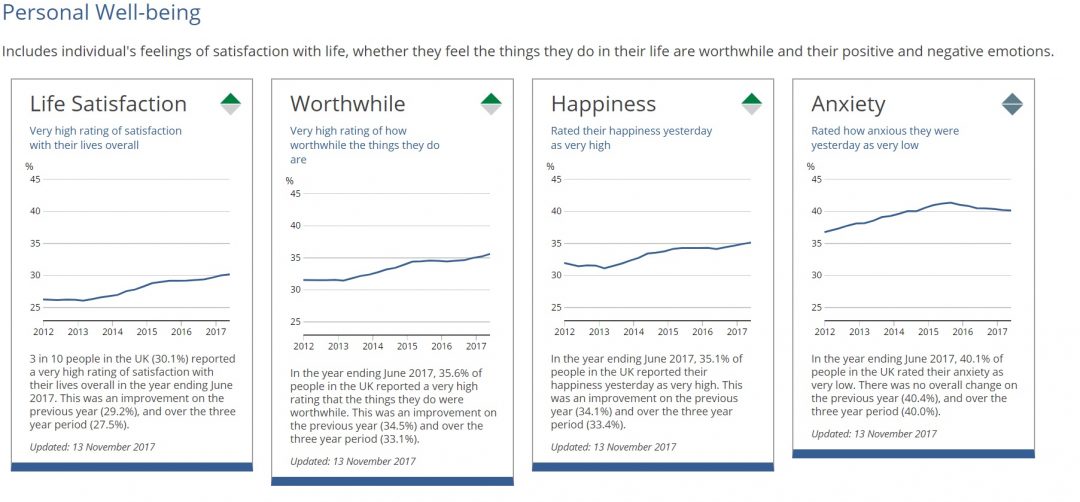Today the Office for National Statistics (ONS) have released their estimates of personal wellbeing in the UK, with analysis by country, age and sex. David Tabor, from the ONS shares the key messages and calls for readers to take part in a survey to gather feedback about ONS personal wellbeing outputs.
Since 2011, we have asked personal well-being questions to adults in the UK. They provide insight into people’s feelings about their lives and surroundings which economic statistics (such as GDP) alone cannot provide. This information aims to support better decision making among policy-makers, individuals, communities, businesses and civil society.
Key findings
- Continued, but small, improvements: In the year ending September 2017, there continued to be slight improvements in the UK for average ratings of life satisfaction (7.7 out of 10), feeling that the things done in life are worthwhile (7.9 out of 10) and happiness (7.5 out of 10); there was no overall change in reported anxiety levels (2.9 out of 10).
- England driving wellbeing increase: The improvement was driven by England, which was the only UK country with any changes in average reported personal wellbeing over this period.
- Low wellbeing remains proportionally same: The proportion of people reporting low ratings for measures of life satisfaction, worthwhile and happiness remained unchanged since September 2016; there was also no change in those reporting high anxiety.
- Women higher wellbeing, also anxiety: In the year ending September 2017, women reported higher life satisfaction, worthwhile and happiness ratings compared with men but also reported higher levels of anxiety.
- Specific age groups seeing continual improvements: There have been improvements for all measures of personal wellbeing for those aged 30 to 34, 40 to 59 and 65 to 69 years, since we began measuring personal wellbeing in 2011.
Why do we report this data?
It is important to consider a variety of aspects of life, such as people’s thoughts and feelings about their current situation, to explore if and how they could have an impact on people’s well-being.
The wellbeing dashboard is our current tool to display measures for the different areas of life that matter most to the UK public.

Personal wellbeing in the UK: October 2016 to September 2017
Today’s figures provide the latest headline estimates of personal wellbeing in the UK. Average ratings of life satisfaction, feeling that the things we do in life are worthwhile and happiness have slightly increased in the UK.
Today’s update also provides a breakdown of personal wellbeing by age and sex. For example, in the year ending September 2017 figures have shown, as noted above, that women report higher life satisfaction, worthwhile and happiness ratings compared to men but interestingly they also report higher levels of anxiety.
In addition to providing data on mean averages, it is also worth considering the distribution of the figures. As part of our personal well-being outputs, we provide analysis on ‘thresholds of personal wellbeing’, which look at those providing high and lower ratings of personal wellbeing. Our latest report has shown that, comparing the years ending September 2012 and 2017, fewer people have reported low levels of life satisfaction, worthwhile and happiness over time. We have also seen a decrease in the number of people reporting high levels of anxiety.
Next steps: have your say
We are currently in the process of reviewing our future personal well-being publications. One area that may be of interest is to explore the differences between those reporting the lowest and highest levels of personal well-being further and to look at any inequalities between groups in more depth.
You can help inform our work by sharing your opinions in this short survey.
Your feedback will be very valuable in making our results useful and accessible. If you have any questions, please contact: QualityOfLife@ons.gsi.gov.uk.
